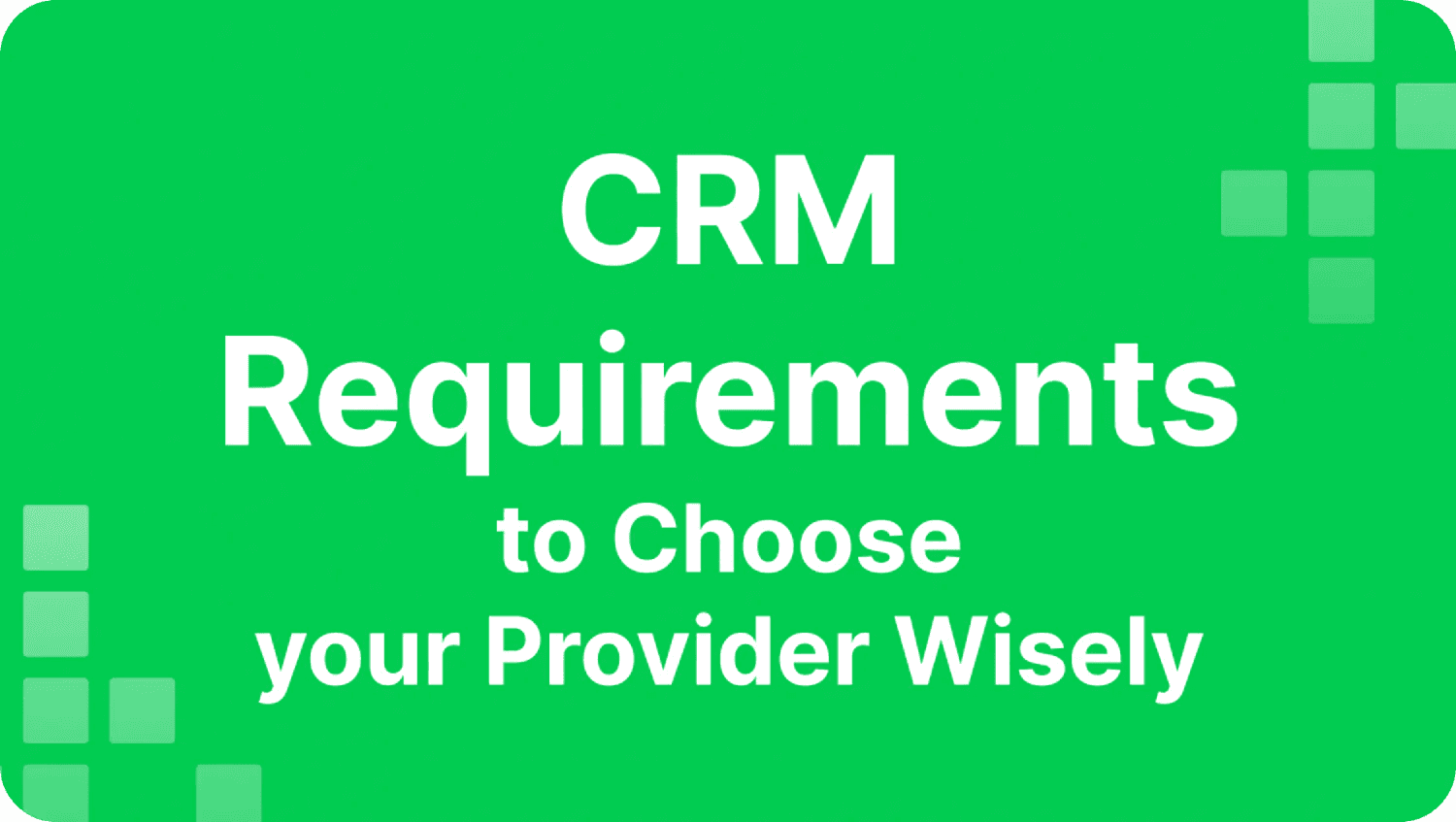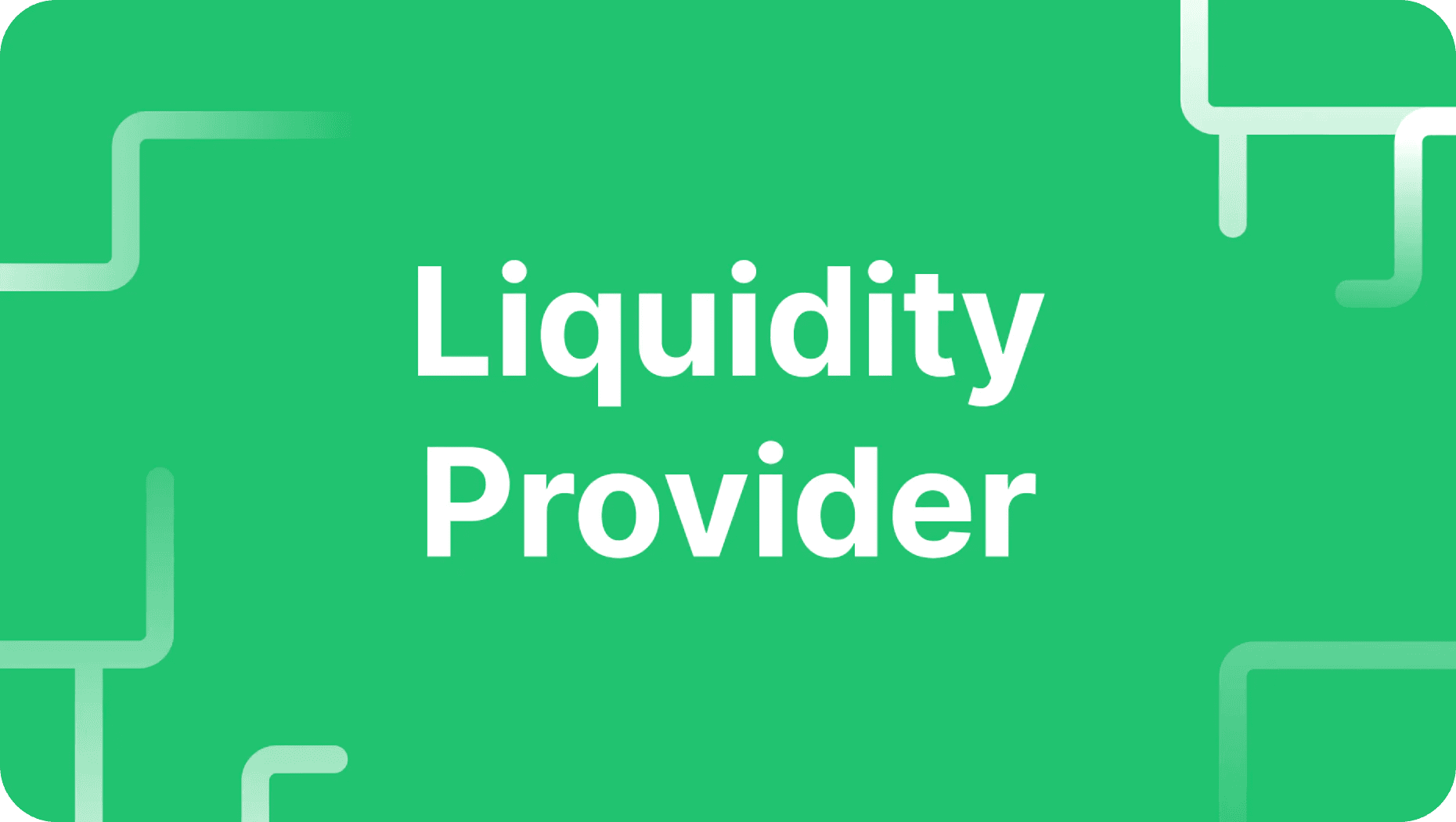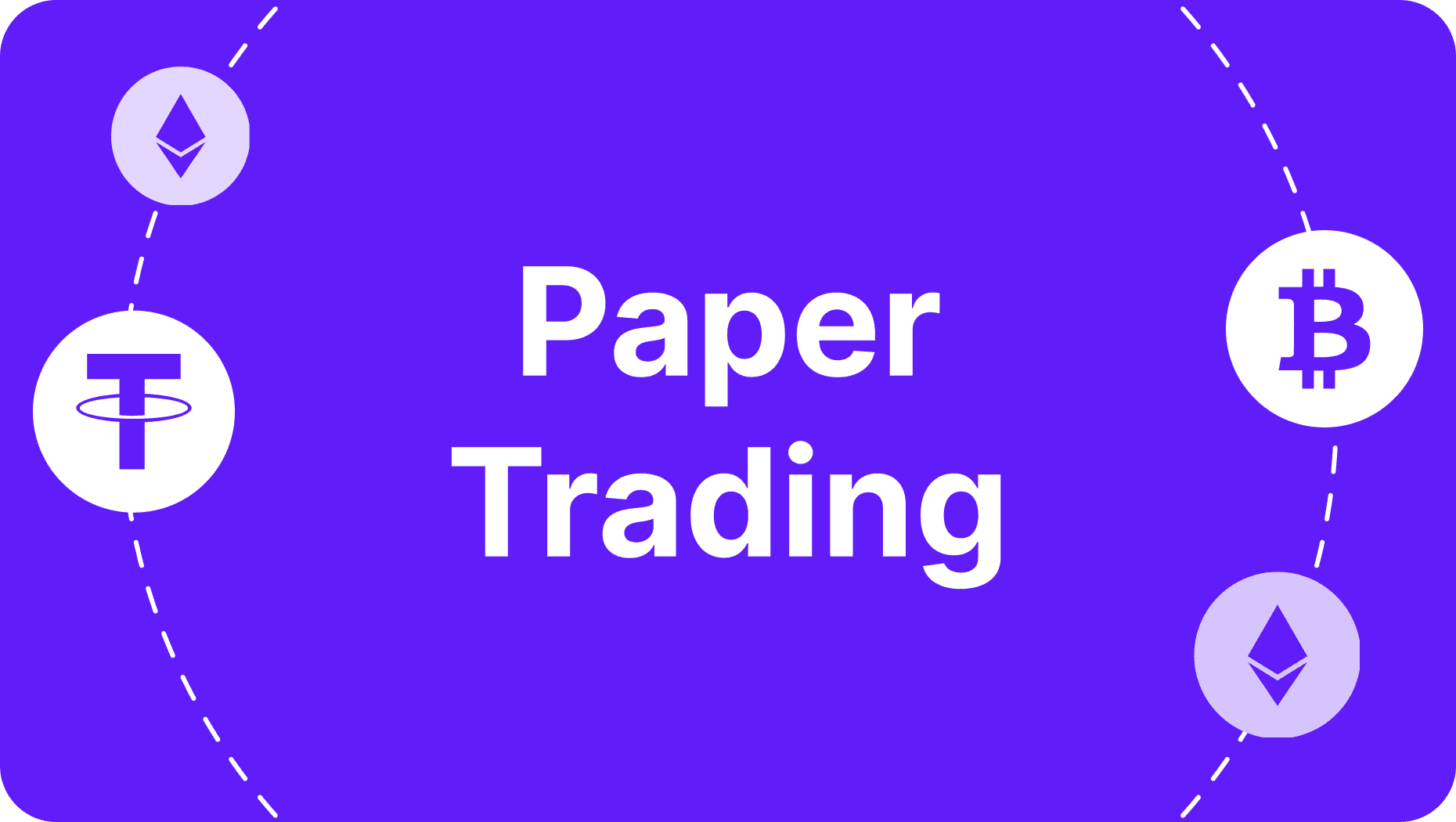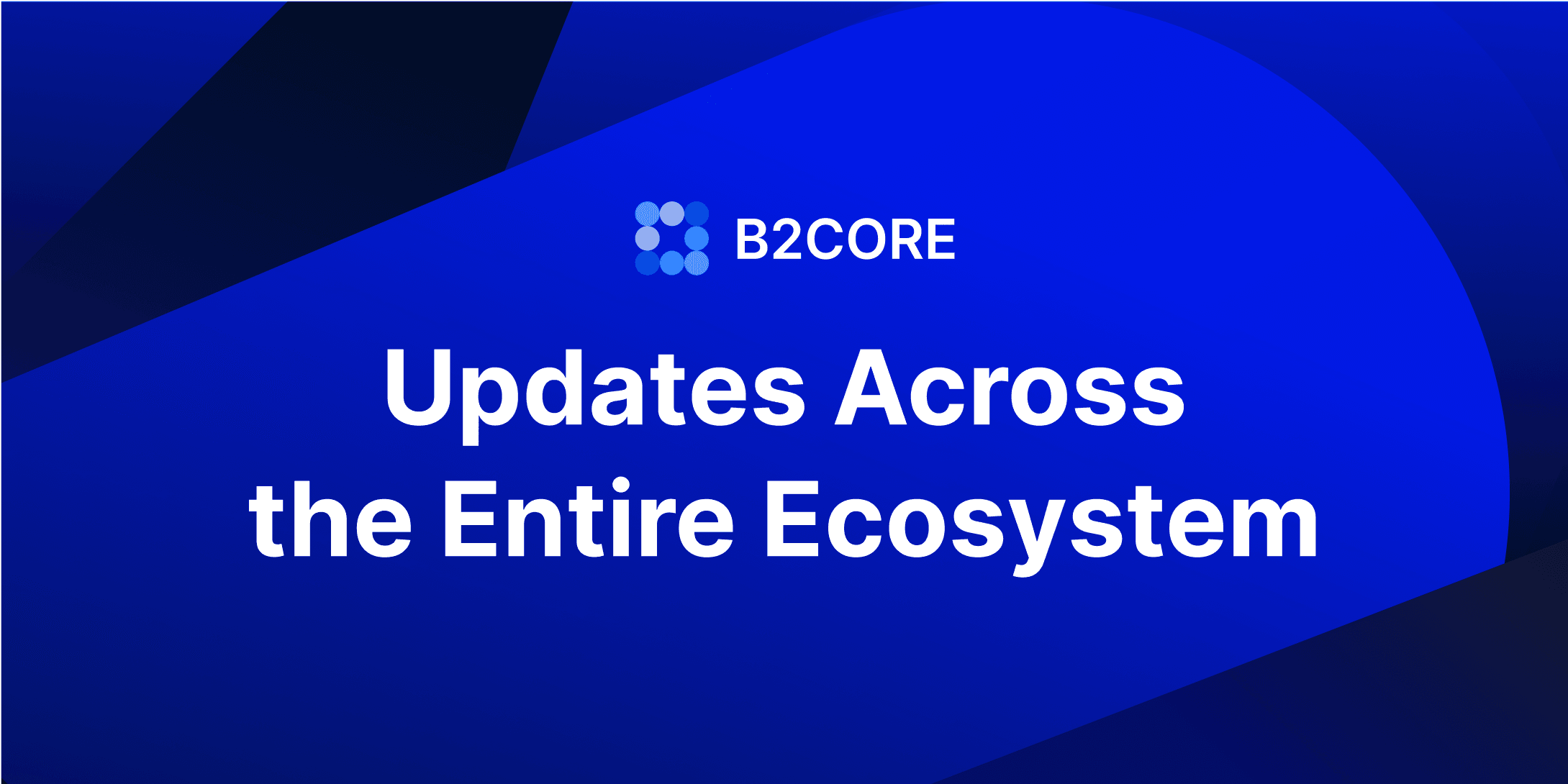Share
0
/5
(
0
)
Participating in the brokerage sector requires handling fierce competition. Customer Relationship Management (CRM) systems are pivotal tools in modern business practices, helping companies streamline operations and enhance customer interactions. Revenue from CRM software reached $48.7 billion in 2021, and from 2021 to 2028, it is expected to increase at a CAGR of 14.2%. These stats also refer to Forex brokerages. Successful CRM Implementation is essential for managing customer data, improving sales processes, and driving business growth.
In this article, we will explore why CRM is crucial for Forex brokerages, highlight the requirements for CRM evaluation criteria, detail its benefits, and highlight key features.
Key Takeaways
CRM systems are crucial for FX brokerages to handle client data, increase sales, and boost growth.
CRMs that manage large transaction volumes and guarantee regulatory compliance are crucial for brokerages.
Customisable CRMs enable brokerages to serve customers more effectively and customise operations.
Reliable security protocols and integration capabilities are essential components of efficient systems.
Understanding CRM in the Forex Brokerage Industry
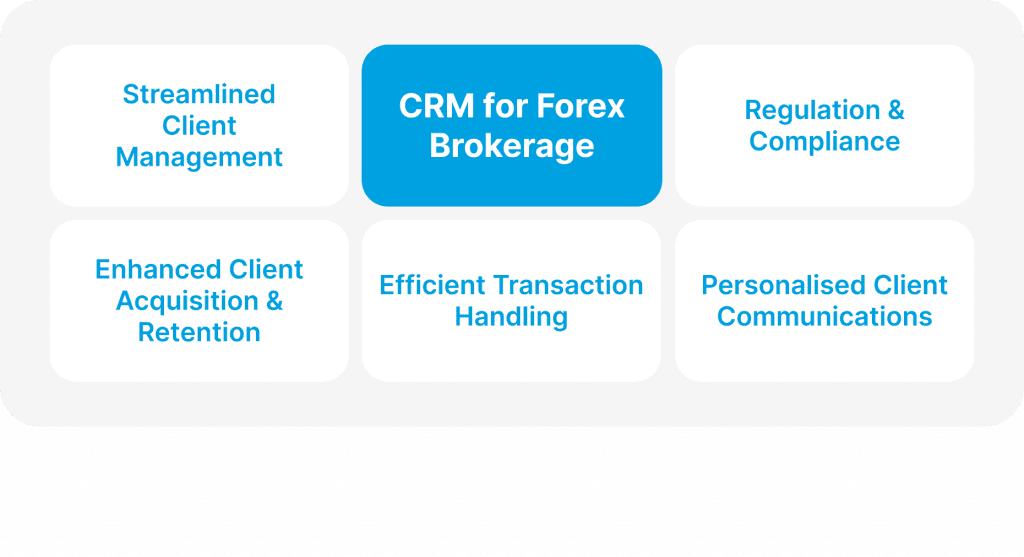
Businesses use a software program called a CRM system to track and manage their relationships with present and potential clients. CRMs increase overall client management, centralise consumer data, and simplify procedures. They are crucial for monitoring interactions, automating various sales and marketing tasks, and organising client data.
Forex brokerages differ from other industries in that they have particular requirements. Managing high transaction volumes, acquiring and keeping clients, adhering to legal regulations, and providing individualised client interactions are some of these needs.
Client Acquisition and Retention
Forex brokerages must attract new business and retain their current clientele. CRM software facilitates lead tracking, customer contact analysis, and marketing campaign management. This guarantees that existing clients receive ongoing support and engagement and that prospective clients become active traders.
Handling Large Volumes of Transactions
Every day, trading forex requires a lot of transactions. Forex CRMs need to be able to manage these vast volumes with ease. They track transaction histories, deliver real-time updates, and produce thorough reports. This feature guarantees brokerages can keep correct records and run their business efficiently.
Regulation and Compliance Needs
Compliance with regulatory requirements is essential for the Forex industry to function. CRM solution manages KYC and AML procedures, assisting brokerages in remaining compliant. In addition to keeping track of and organising client paperwork, they monitor transactions for unusual activity and ensure that all legal requirements are fulfilled.
Customised Communications with Clients
Keeping solid customer relationships requires an individual approach and personalisation. Forex CRMs allow brokerages to customise their communications to clients' unique interests and behaviours. This comprises tailored trade offers, focused marketing strategies, and individualised communications. These kinds of exchanges improve client loyalty and happiness.
How CRM Systems Address These Needs
CRM tool meets these particular needs through several features, and let's discuss them below:
By automating marketing tasks, CRMs enable brokerages to conduct focused campaigns, monitor their success, and adjust their tactics in response to performance information.
Forex CRMs can be integrated with payment processors, trading platforms, and other technologies. Thanks to this seamless connectivity, all customer interactions and transactions are guaranteed to be recorded and handled effectively.
CRM software manages customer data, tracks prospects, and offers insights into sales performance to optimise sales processes. As a result, brokers benefit from more clientele and higher conversion rates.
Automated KYC and AML checks are just some CRM tools to manage compliance needs. This guarantees that brokerages follow rules and regulations without doing it by hand.
CRM solutions let brokerages provide individualised service by monitoring client interactions and preferences. This contributes to increased client satisfaction and the development of solid customer connections.
Top 5 CRM Requirements for Forex Brokers
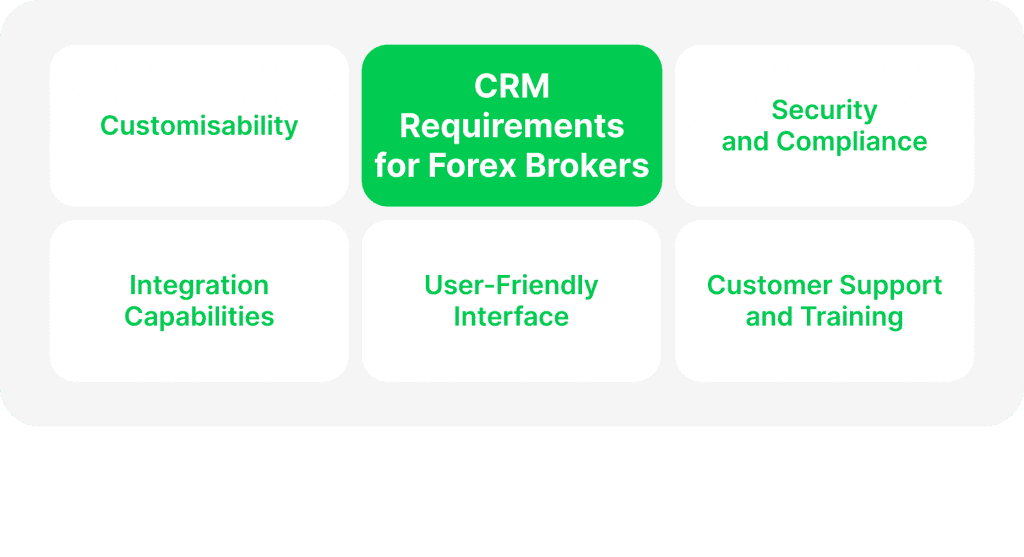
The choice of CRM is essential for Forex brokers who want to improve their business and cultivate a loyal clientele. The best forex CRM system should help the firm expand and adapt to market conditions while fulfilling its needs. Take a look at the CRM requirements checklist below.
Customisability
A CRM system that can be modified to match the unique business procedures of forex brokers is essential. This involves adapting the internal systems and interface's visual components to the brokerage's requirements. Brokers may design an environment that optimises productivity and improves user experience with the help of a CRM that they can customise. Maintaining operational effectiveness and assuring long-term success depends heavily on the CRM's adaptability to business requirements.
By personalising a CRM, brokers may create an environment that maximises efficiency and enhances user experience. For instance, a broker might modify the CRM's workflow to fit their account opening procedure, guaranteeing legal compliance and expediting the onboarding process for new customers.
Integration Capabilities
A strong CRM must work in unison with various trading platforms and other critical technologies, such as marketing tools and accounting systems. The ability to integrate systems guarantees that data moves between them seamlessly, which improves operational efficiency all around. Access to APIs for data interchange is essential for keeping data current and promoting quick decision-making. This integration is critical to creating a unified system for thorough customer management.
For example, a forex broker can automatically update open positions, trading histories, and client account balances by integrating their CRM with a trading platform. Thanks to this real-time data synchronisation, customer relationship managers are constantly armed with the most recent information, which enables them to offer personalised support and spot possible cross-selling opportunities.
Security and Compliance
Because money and personal data are very sensitive subjects, security is a top priority for Forex brokers. To guard against illegal access and data breaches, a top-tier CRM needs to have strong security features like data encryption and strict access limits. Also, to guarantee that brokers fulfil their legal responsibilities, the CRM should facilitate compliance with essential rules. Trust-building and legal avoidance depend on features that make regulatory compliance more accessible, like audit trails and automated reporting.
User-Friendly Interface
Having a smooth UI is no longer an option but a necessity. 94% of the first impression is connected to the design. CRM system is no exception. The user interface of the CRM system should be simple to use and straightforward, making it easier to manage customer interactions. Both employees and clients should find it simple to use, which will lower the learning curve and increase output. Another essential component is mobile accessibility, which enables brokers to oversee operations and manage client relationships while on the go. The total customer experience is improved with a user-friendly CRM, which raises satisfaction and retention rates.
Customer Support and Training
Continuous technical assistance and training are essential for a CRM system's effective setup and operation. The CRM provider must supply all-inclusive support services, encompassing regular updates and troubleshooting support. Assistance with onboarding and training materials helps guarantee that employees can use the CRM to its maximum advantage. Sustaining excellent customer service processes and adjusting to new features requires constant access to training resources and support.
[aa quote-global]
Fast Fact
The first contact management software for PCs was introduced in 1987. This software, called ACT!, gathered and partially analysed customer data to enable digitally customised interactions. ACT! is considered the genuine forerunner of the modern CRM system.
[/aa]
The Best CRM Providers
When choosing a Forex CRM provider for brokerages, several variables must be considered to ensure the system will satisfy your business processes. Essential factors include system requirements, CRM selection criteria, integration possibilities, and security precautions. As a pool of providers is available, we will try to simplify your decision-making process.
B2CORE
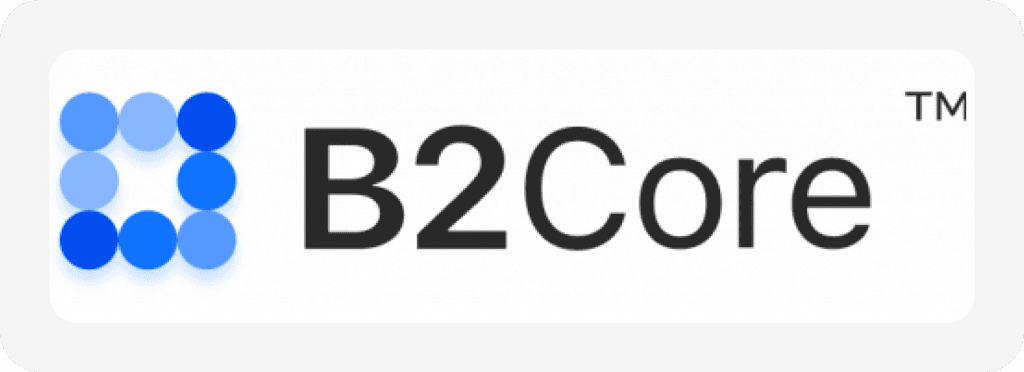
B2CORE is a full-featured CRM solution for companies involved in forex and cryptocurrencies. It is a flexible option for brokerages because of its advanced trading user interface, transaction monitoring, and connectivity with many payment methods. In addition, B2CORE offers trade analytics and history, flexible user interfaces, and robust security features like anti-fraud software and 2FA.
The customisable UI and comprehensive reporting features of B2CORE are advantageous for forex brokerages. The platform ensures smooth business operations by supporting multi-level KYC procedures and integrating with well-known trading platforms. B2CORE's overall capability is further enhanced by its support for external interfaces with marketing tools and rate providers. This further solidifies its reputation as a dependable option for managing client engagement and business goals.
Salesforce
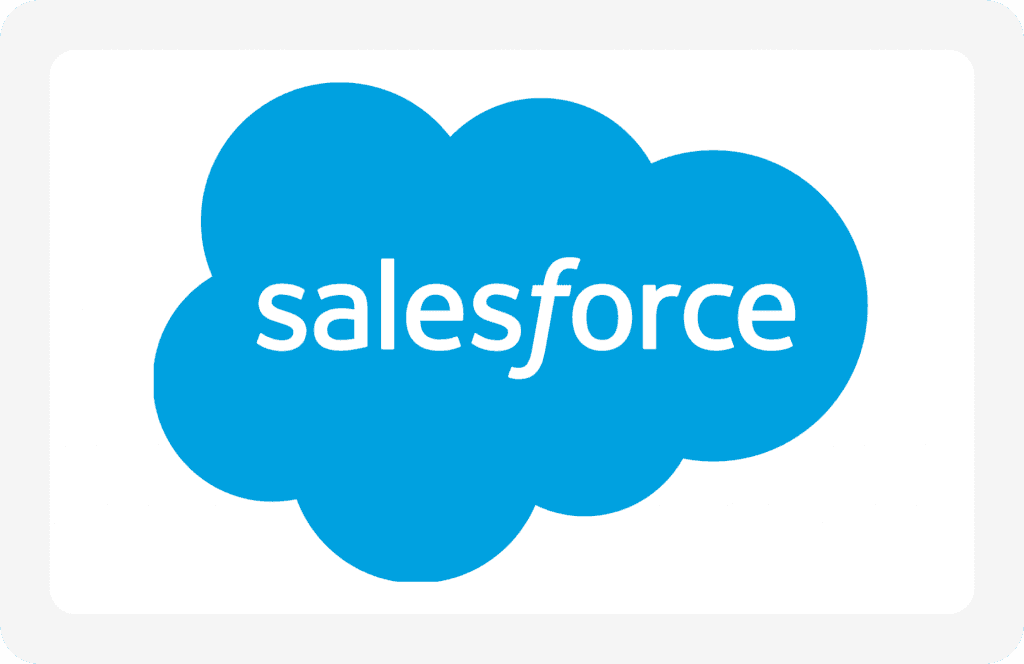
Salesforce offers a highly configurable CRM platform that can be customised to meet the specific requirements of Forex brokerages. Its extensive feature set includes sales forecasting, contact management, and in-depth analytics. Because of Salesforce's adaptability, companies may incorporate many tools and apps to improve customer care procedures and bolster security measures.
Because of Salesforce's exceptional integration features, brokerages may link their CRM to marketing campaigns, accounting software, and other business needs. This seamless connectivity fosters strong customer relationships and effective customer interaction and guarantees that all client data is centralised. The platform is an excellent option for Forex brokerages looking for a scalable and customisable solution because of its flexibility in accommodating various CRM system requirements.
HubSpot CRM
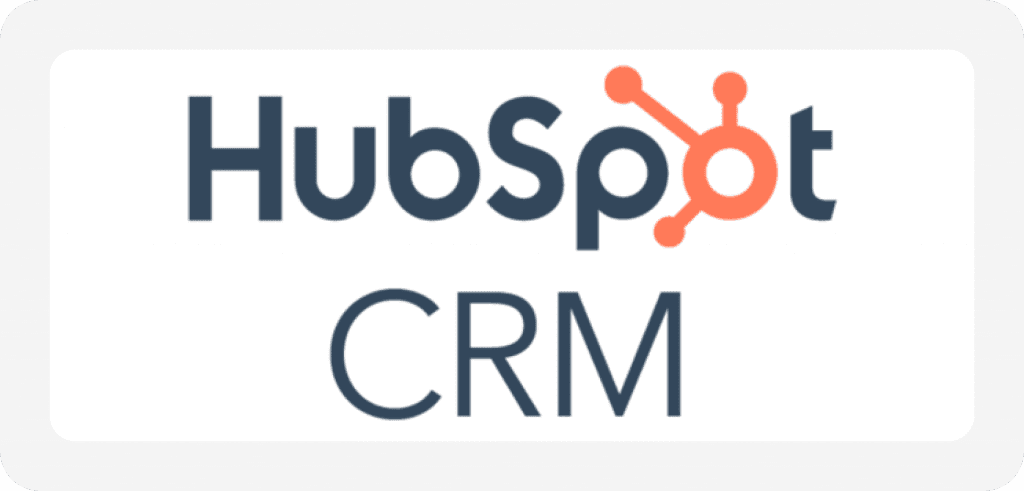
The straightforward and user-friendly interface of HubSpot CRM is well-known for simplifying managing client contact information and operational procedures. The platform offers a variety of CRM solutions to help customers succeed and raise customer satisfaction levels. The uncomplicated architecture of HubSpot guarantees that all CRM data is readily available and controllable.
With HubSpot CRM's robust marketing and sales solutions, brokerages may streamline customer interaction initiatives. Firms that use features like sales cycle management, lead monitoring, and automated email marketing may cultivate strong client relationships. Thanks to the platform's strong security features and interoperability with other e-commerce platforms, all consumer contacts are safe and efficient.
Making The Right Choice
Understand your firm's unique requirements before choosing the best CRM software. Consider elements like the amount of client data, necessary integrations, and security procedures. Ensure the CRM system accommodates growing consumer engagement and your company's expansion.
Examine the CRM software selection criteria. Give top priority to essential factors like scalability, customisation possibilities, and ease of use. Study user reviews and try out demo versions to see how well CRM platforms work with your operational procedures. Pay attention to systems that provide a wide range of capabilities without sacrificing performance or security.
Security in CRM systems is crucial. Ensure that the CRM supplier of your choice has strong security measures, including encryption, 2FA, and frequent security updates. This guarantees adherence to industry regulations and the security of confidential consumer data.
Tips and Procedures for Choosing a CRM Provider
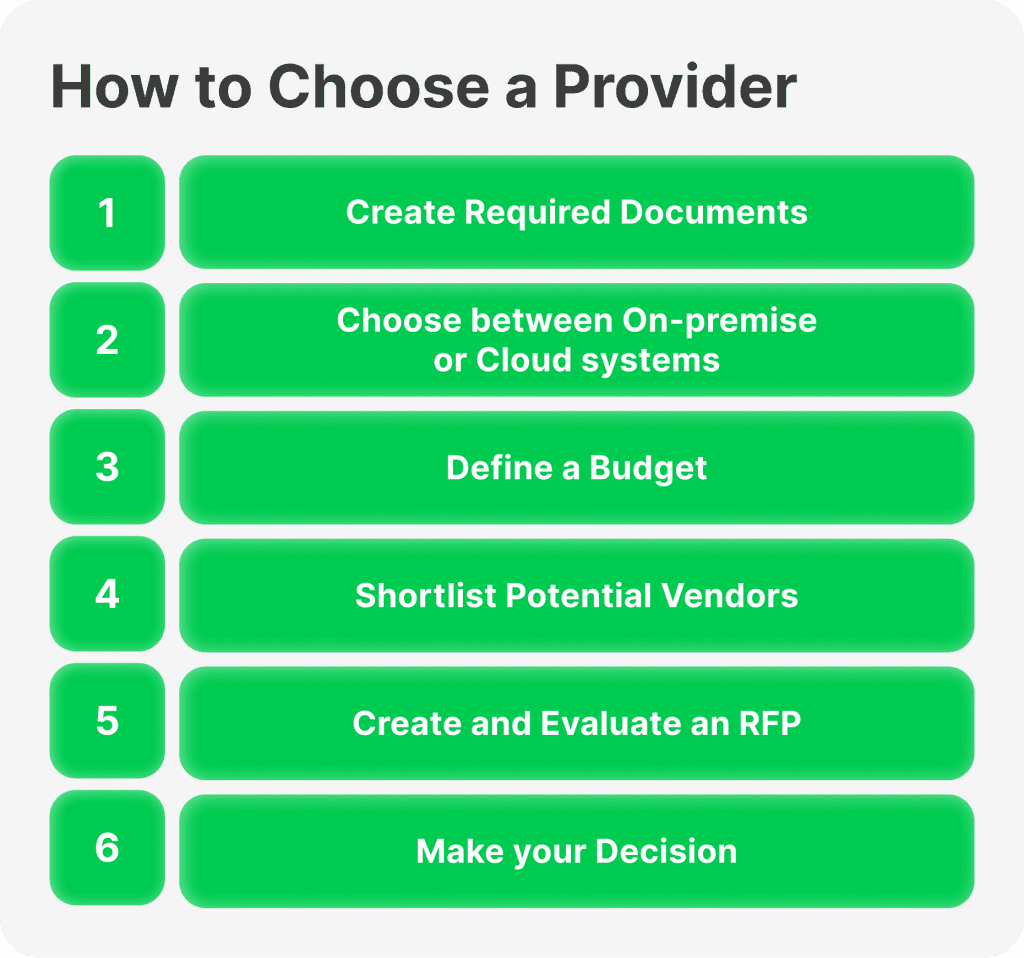
After understanding the requirements for the right CRM software, this section will discuss the necessary procedures for choosing one.
Creating a Requirements Document
Start by describing your company's goals for using a CRM system. These include raising sales, boosting customer involvement, or speeding up response times.
Consider necessary features, such as support for mobile devices, email integration, customisation possibilities, and data migration capabilities. Ensure that your marketing automation, customer success, and sales management objectives align with the CRM.
On-Premise vs. Cloud
Recognise the variations between on-premises and cloud-based CRM systems. The first option provides more control and customisation, but the latter frequently has lower initial costs and requires less maintenance.
Assess your financial constraints, security requirements, and the degree of customisation needed to find the best option for your company. Think about how each choice affects the quality of your data and the systems you already use.
Budgeting for Software
Create a precise spending plan for your CRM software that accounts for up-front and ongoing expenses. In your budget estimate, account for setup, training, integrations, customisation, and continuing support.
Use price guides, speak with professionals, and consider the CRM system's long-term worth. Make sure your cost analysis considers data integrity and robust security measures.
Shortlisting Potential Vendors
Research pricing policies, reputation, and industry specialisation to find possible providers. Pay attention to how well suppliers meet your needs and their capacity to deliver the required features and assistance. To assess a vendor's dependability, address them professionally, communicate your needs clearly, and request references. Evaluate how well they can improve consumer interaction and integrate with your current systems.
Creating and Evaluating an RFP
Describe the CRM's goals,y features, and expectations for the provider. Include goals, essential and desired features, vendor expectations, and a precise timeframe. Give your sales staff specifics about the CRM procedures and expected results. Ensure that the technical and sales teams are involved in the evaluation process, thoroughly review the responses, and invite the chosen vendors for demonstrations. To determine the best CRM solution, consider user adoption and feedback.
Making Your Decision
Once you have received responses to the RFP, invite leading vendors to offer demos. This will allow you to observe how their systems manage customer contact details and sales data. Make your choice based on the system's capabilities, vendor reputation, and budget. Ensure the CRM you've selected advances your digital marketing initiatives, aligns with your pipeline management procedures and supports your business objectives.
By following these guidelines, you can make sure the CRM system you select fosters strong customer connections, fits your company requirements, and gives you the tools you need to analyse trends and increase customer engagement.
Final Thoughts
Selecting the right supplier is essential for business success. The selection process includes understanding your company's needs, comparing the features of various CRM systems, and considering affordability, convenience of use, and integration possibilities. To see the software in action, do extensive research, read reviews, and ask to attend demonstrations.
Stick to an organised plan to execute the selected CRM properly. Make sure the data migration goes well, provide your staff with the proper training, and monitor the system's functioning at all times. Following these guidelines may optimise the CRM's features and improve your entire customer management approach.
FAQ
How Do You Determine Whether a Business Requires a CRM System?
If your customer support staff spends more time responding to complaints than predicting the clientele's needs, it may be time to purchase a CRM system.
What is the Cycle of CRM?
The CRM cycle is a continuous process that aims to enhance interactions and experiences throughout the customer journey by collecting, evaluating, and applying customer data.
What Aspects Need to be Considered When Choosing CRM Software?
Consider factors such as cost per user, alignment with corporate objectives, user feedback, simplicity of use and training, system integrations, customisation possibilities, compatibility with mobile devices, and the possibility of testing the program before buying.
Read also


